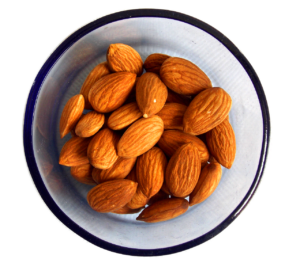 In the quest for a good, restful night’s sleep with less tossing and turning, people are reaching out to learn more about natural sleep aids and sleep-inducing foods.
In the quest for a good, restful night’s sleep with less tossing and turning, people are reaching out to learn more about natural sleep aids and sleep-inducing foods.
At the top of many sleep foods lists are almonds – a healthy food that’s high in two of the best-known sleep substances – magnesium and melatonin.
Melatonin is a hormone that’s produced by a gland located in the center of the brain. At night or in the dark, this gland naturally releases melatonin to regulate the sleep cycle. A recent study appeared in the journal Nutrients called Dietary Sources of Melatonin.
The researchers in this study say that in the realm of plant foods, nuts contain the highest amount of melatonin. Almonds, walnuts and pistachios have good amounts of it. The study goes on to say it’s a proven fact that melatonin concentration in human blood can significantly increase after a person eats some melatonin-containing food.
Almonds are a special nut as they contain the highest magnesium levels. One ounce of almonds, which is about a handful or 23 nuts, contains 80 milligrams of magnesium. This is 20% of the suggested daily value of 400 milligrams.
Magnesium has the ability to promote sleep and this is thought to be linked to its actions in lessening inflammation in the body. In a study from the University of Medical Sciences in Iran, research was done with 46 adults who were experiencing insomnia. Taking two magnesium tablets twice a day resulted in significant increases in sleep duration and reduced cortisol levels in the body. Cortisol is a stress hormone made by the adrenal glands that can keep people awake.
A study on almonds as a sleep food for animals was reported in the Journal of Natural Medicine. A water-based extract of almonds was used in the study. With the almond extract, the scientists observed a significant prolongation of total sleeping time as well as significant increases in the deepest levels of sleep. The results suggest that a water-based extract of almond has significant sedative effects, which may support its therapeutic use for insomnia.
To increase magnesium in one’s diet, almonds can be eaten as a snack before bedtime and may also be used in any recipe that calls for walnuts, pecans or other nuts. Some ideas are to include them in granola mixtures, baked goods, fruit salads, vegetables and yogurt. Soaking raw almonds in a bowl of water overnight and drying them in the oven at low heat is known to increase their nutritional value and help with digestion, however this isn’t necessary in order to enjoy their benefits.
One magnesium-based supplement shown to be effective for insomnia is Sleep Minerals II from Nutrition Breakthroughs. This formula contains highly absorbable forms of magnesium and calcium, which are the best minerals for sleeplessness and insomnia, as well as for menopause insomnia, teenage insomnia, heart health, restless legs syndrome and bone strength.
Sleep Minerals II also includes vitamin D and zinc and is delivered in a softgel form with healthy carrier oils, making it more quickly absorbable than tablets or capsules and providing a deeper, longer-lasting sleep.
Tammy M. of Meridian, Idaho says: “I was plagued with insomnia for five years and desperate for a breakthrough. Nothing has helped me more than Sleep Minerals II – I’m so sold on them I could go door to door promoting them. I’m 60 years old and have never slept so soundly.”
Richard P. of Parkville, Maryland says: “The Sleep Minerals are making quite a difference. I was regularly waking up at around 3:00 a.m. and after a few days use my sleep improved quite a lot. I wake up once a night to go to the bathroom, but the great thing is, I then fall back asleep and sleep several more hours. This has been a great improvement.”
A healthy plan for good sleep is to make good use of magnesium-rich foods such as almonds and also include an effective magnesium and calcium supplement for natural relief of sleeplessness.
This health news is provided by Nutrition Breakthroughs, a publisher of nutrition articles and supplier of effective natural remedies since 2001. Nutrition breakthroughs makes Sleep Minerals II, the effective natural sleep aid with calcium, magnesium, zinc and vitamin D, and also Joints and More, the natural solution for joint relief, aches and pains, stronger hair and nails and more energy.





